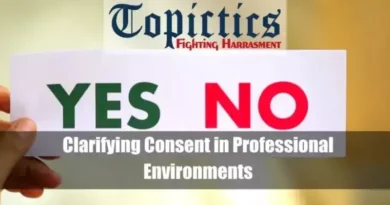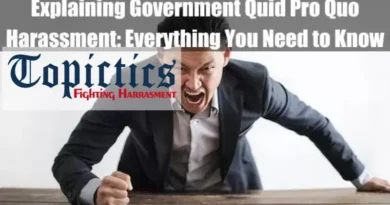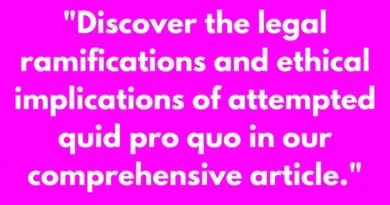Quid pro quo itself isn’t illegal – it just means “something for something.” It becomes illegal when the exchange involves something improper, like a bribe (offering something of value for official influence) or extortion (threatening harm unless a demand is met).
I. Introduction
Quid pro quo is a dance as old as time, a delicate balancing act between two parties with something to offer. Quid pro quo can be a powerful force for good, driving innovation and progress in all walks of life. But it can also be a dangerous weapon to exploit and manipulate the vulnerable. In the workplace, quid pro quo harassment is a cancer that undermines morale, productivity, and the dignity of workers. It is a betrayal of trust and a violation of fundamental human rights. This article will discuss “Is Quid Pro Quo Illegal,”21 Accused Celebrities and Politicians,” and “Quid Pro Quo Harassment Examples.”
II. What is quid pro quo?
“Quid pro quo” is a Latin expression signifying a reciprocal exchange of goods or services. A reciprocal dance of exchange, where one offering calls forth another, a delicate balance of give and take. Quid pro quo agreements are standard in business and politics and can be perfectly legal. However, quid pro quo can also describe unethical or illegal behavior, such as bribery and extortion.
III. Is quid pro quo illegal?
Whether or not quid pro quo is illegal depends on the specific circumstances. In general, quid pro quo is illegal if it involves exchanging something of value, such as money, power, or influence, for something not legally due to the other party. For example, it would be illegal for a government official to offer a contract to a company in exchange for a bribe.
Quid pro quo harassment is a restricted type of quid pro quo in the workplace. It occurs when a supervisor or other person in authority demands sexual favors from an employee in exchange for job-related benefits, such as a promotion or raise. Quid pro quo harassment is illegal under both federal and state law.
- Also, read How to Create an Anti-Harassment Policy: 9 Effective Steps.
- Also, read How to Create an Effective Anti-Harassment Policy Under Title IX?
IV. Why is quid pro quo illegal?
Quid pro quo is illegal because it is a form of abuse of power. When someone in a position of authority uses their power to coerce another person into doing something they do not want to do, it violates that person’s rights. Quid pro quo can also create a hostile work environment and discourage people from reporting other forms of harassment or discrimination.
- Also, read How to Prevent Quid Pro Quo Harassment: 20 Effective Ways.
- Also, read 20 Ways to Prevent Quid Pro Quo Harassment Under Title IX.
V. 19 Quid Pro Quo Accused Celebrities and Politicians
A. 14 Accused Celebrities with Quid Pro Quo Harassment
1. Matt Lauer
Matt Lauer was among the most powerful men in television news for over 20 years. He was a co-anchor of the Today Show and had a reputation for being a tough but fair interviewer. Lauer’s career at NBC News came to a crashing halt in 2017 when multiple women accused him of sexual misconduct.
The allegations against Lauer included unwanted touching, kissing, and groping. Some women alleged that Lauer offered them job opportunities or other career benefits in exchange for sexual favors. For example, one woman alleged that Lauer told her she would have a better chance of getting a job at NBC if she slept with him.
Lauer denied the allegations but was fired from NBC News in November 2017. He has not been charged with any crimes.
- Also, read 20 Quid Pro Quo Harassment Examples and How to Stop Them.
2. Harvey Weinstein
Weinstein was a towering figure in Hollywood, with a vast network of connections and influence. He co-founded Miramax Films, which produced some of the most successful films of the 1990s and 2000s, including Pulp Fiction, Shakespeare in Love, and Chicago. Weinstein was also a significant donor to the Democratic Party and had close ties to politicians such as Hillary Clinton and Barack Obama.
In 2017, Weinstein was accused of sexual misconduct by over 100 women, including actresses, models, and employees of his production company. The allegations included rape, sexual assault, and harassment. Weinstein denied the allegations but was eventually fired from his company and blacklisted by Hollywood.
In 2020, a jury in New York City convicted Harvey Weinstein of rape and sexual assault. He was sentenced to 23 years in prison. He is currently appealing his conviction.
3. Bill Cosby
Bill Cosby was among the most popular comedians and actors worldwide for decades. He starred in The Cosby Show, one of the most successful sitcoms ever. Cosby was also a successful businessman and author.
In 2015, Cosby was accused of sexual assault by over 60 women. The allegations spanned decades, and many women alleged that Cosby used his power in the entertainment industry to coerce them into having sex with him.
Cosby denied the allegations but was eventually arrested and charged with sexual assault. In 2018, he was found guilty. He was declared guilty of three counts of aggravated indecent assault and punished with three to ten years in prison. Afterward, the Pennsylvania Supreme Court overturned his conviction in 2021, and he was released.
- Also, read Explaining Quid Pro Quo Harassment Under Title IX.
- Also, read Quid Pro Quo Harassment: What It Is and How to Respond.
- Also, read The 13 Legal Implications of Quid Pro Quo Harassment.
4. Dustin Hoffman
Dustin Hoffman is a two-time Academy Award-winning actor accused of quid pro quo sexual harassment by multiple women. In 2017, a former child actress, Anna Graham Hunter, alleged that Hoffman groped her and made inappropriate comments when she was 17. Hunter said that Hoffman was her mentor at the time and that she felt pressured to comply with his advances because she was afraid of losing his support.
In the same year, actress Kathryn Rossetter alleged that Hoffman exposed himself to her and made inappropriate comments when she audited for a role in the play “Death of a Salesman” in 1984. Rossetter said that she felt humiliated and degraded by Hoffman’s behavior.
Hoffman has denied all of the allegations against him. He has said he is “deeply sorry” if his actions have made anyone uncomfortable. Still, he has also said he does not believe he has ever engaged in sexual harassment.
- Also, read How to Prove Quid Pro Quo Harassment: 13 Powerful Evidences.
- Also, read 20 Psychological Effects of Quid Pro Quo Harassment.
5. Louis C.K.
Louis C.K. is a comedian and actor accused of quid pro quo sexual harassment by multiple women. In 2017, five women came forward to allege that C.K. had masturbated in front of them without their consent. The women said that C.K. had used his power in the comedy industry to coerce them into submitting to his advances.
C.K. has admitted to the allegations against him. He has said he is “deeply sorry for the pain” he has caused and is “committed to learning from his mistakes.”
6. Al Franken
Al Franken is a former comedian and politician who served as a U.S. Senator from Minnesota from 2009 to 2018. In 2017, multiple women accused him of sexual misconduct, including groping and kissing them without consent. He stepped down from the Senate in December 2017.
- Also, read Explaining Non-Sexual Quid Pro Quo Harassment.
- Also, read Explaining Government Quid Pro Quo Harassment.
- Also, read 20 Financial Effects of Quid Pro Quo Harassment.
7. Charlie Rose
Charlie Rose is a former journalist and T.V. host accused of sexual misconduct by multiple women in 2017. The allegations included unwanted touching, kissing, groping, and exposing himself. Rose was fired from CBS News and PBS in 2017.
8. Matt Damon
Matt Damon is an actor and producer accused of quid pro quo sexual harassment in 2017. Rose McGowan, an actress who has accused Harvey Weinstein of rape, alleged that Damon had told her that she was blacklisted from working on Kevin Smith’s film “Dogma” because she had refused to have sex with Weinstein. Damon denied the allegation but later apologized for his role in perpetuating the culture of silence surrounding sexual harassment in Hollywood.
9. Russell Simmons
Russell Simmons is a co-founder of Def Jam Recordings and a successful businessman. He has been accused of sexual misconduct by over 20 women, including actresses, models, and employees of his companies. Simmons has denied the allegations but has stepped down from his various business ventures after the accusations.
10. Casey Affleck
Casey Affleck is an actor and director. He has been accused of sexual misconduct by two women, both former employees of his. Affleck initially denied the allegations but later settled a lawsuit with one of the women.
11. Mark Halperin
Mark Halperin is a journalist and political analyst. He has been accused of sexual misconduct by multiple women, including several former colleagues. Halperin has admitted to some of the allegations but denied others. He has been fired from his job at CNN and suspended at MSNBC because of the accusations.
12. Kevin Hart
Kevin Hart is a comedian and actor. He has been accused of sexual misconduct by two women, both of whom were former colleagues. Hart initially denied the allegations but later apologized for his behavior.
13. Aziz Ansari
Aziz Ansari is a comedian and actor. He has been accused of sexual misconduct by one woman. Ansari has admitted that he made some mistakes but denied that he assaulted the woman.
14. Jeffrey Epstein
Jeffrey Epstein was a wealthy financier accused of sex trafficking underage girls. He was convicted of sex with a minor and solicitation of prostitution in 2008 and sentenced to 18 months in prison. He committed suicide in 2019 while awaiting trial on new sex trafficking charges.
B. 7 Accused Politicians with Quid Pro Quo Harassment
1. Donald Trump
Donald Trump was accused of quid pro quo during his first impeachment trial in 2019. The House of Representatives voted to impeach Trump on charges of abuse of power and obstruction of Congress for allegedly pressuring Ukraine to investigate his political rival, Joe Biden, in exchange for military aid. He was acquitted by the Senate in 2020.
2. Joe Biden
Joe Biden was accused of quid pro quo during his 2020 presidential campaign. Trump and his allies alleged that Biden had pressured Ukraine to fire a prosecutor investigating a company that employed Biden’s son, Hunter Biden. Biden has denied any wrongdoing.
3. Bill Clinton
Bill Clinton was accused of quid pro quo during his presidency. In 1998, the House of Representatives impeached President Clinton for perjury and obstruction of justice, alleging that he lied about his sexual relationship with White House intern Monica Lewinsky. The Senate acquitted him in 1999.
4. Eliot Spitzer
Eliot Spitzer was accused of quid pro quo during his governorship of New York. In 2008, Spitzer resigned after it was revealed that he had been patronizing a prostitution ring. Some people alleged that Spitzer had used his position as governor to pressure prostitutes to provide him with sexual services.
5. Mark Sanford
Mark Sanford was accused of quid pro quo during his governorship of South Carolina. In 2009, Sanford disappeared for six days, claiming he was hiking the Appalachian Trail. It was later revealed that he had been having an extramarital affair with a woman from Argentina. Some people alleged that Sanford had used his position as governor to provide his mistress with special favors.
6. David Vitter
David Vitter was accused of quid pro quo during his tenure as a U.S. senator from Louisiana. In 2007, Vitter was revealed to have been a client of the same prostitution ring Spitzer patronized. Some people alleged that Vitter had used his position as senator to pressure prostitutes to provide him with sexual services.
- Also, read Workplace Quid Pro Quo Harassment: An Ultimate Guide.
- Also, read Educational Quid Pro Quo Harassment: An Ultimate Guide.
7. Anthony Weiner
Anthony Weiner was accused of quid pro quo during his tenure as a U.S. representative from New York. In 2011, Weiner resigned from Congress after being exposed that he had sent sexually explicit photos and messages to women online. Some people alleged that Weiner had used his position as a congressman to pressure women to send him sexually explicit photos and messages.
VI. 15 Workplace Quid Pro Quo Examples
Quid pro quo harassment is a hidden dance of power and vulnerability in the workplace. People in positions of power use their influence to make promises or threats, and their actions silently demand sexual favors. It is a tragic situation where the lines of consent become blurred by ambition and coercion.
Here are 15 quid pro quo harassment examples:
- A supervisor offers a promotion in exchange for a secret affair.
- An employer threatens to fire an employee if they don’t go on a date.
- A manager hints at a financial bonus if an employee dresses provocatively.
- A supervisor’s gaze implies that an employee’s job depends on sexual favors.
- An employer nonchalantly trades favorable work assignments for private encounters.
- A manager spins a seductive tale, promising a positive performance review to those who engage in sexual activity.
- Job applicants face the uncomfortable ultimatum of compromising their integrity or losing a job offer.
- A supervisor uses their discretion as a weapon, signaling that forgiveness hinges on sexual favors.
- An employer threatens to ruin a former employee’s reputation unless they meet their sexual demands.
- A supervisor dangles career growth opportunities like forbidden fruit, offering them in exchange for sexual impropriety.
- An authoritative figure subtly persuades an employee that their request for time off will be granted if they submit to their advances.
- A manager implies that sales commissions will increase in exchange for a secret affair.
- An employer weaves a web of protection, promising to shield employees from harassment or discrimination complaints if they enter a secret affair.
- A supervisor hints that they will keep quiet about an employee’s mistakes if they submit to their advances.
- An authority figure threatens to demote or transfer employees if they don’t yield to their sexual desires.
Quid pro quo harassment, a sinister workplace abuse, blatantly violates employee rights. It is a legal offense and a moral outrage. Organizations must establish strong policies and procedures for reporting and investigating such transgressions to fight this insidious practice. Employees should never fear retaliation for speaking out against this type of harassment.
VII. Key takeaways from the article “Is Quid Pro Quo Illegal? 19 Accused Celebrities Examples”
- Quid pro quo is illegal in most jurisdictions, including the United States.
- Quid pro quo harassment can take many forms, including demanding sexual favors in exchange for a job, promotion, or raise; threatening to fire or demote someone who refuses to comply with sexual advances; or creating a hostile work environment by making unwelcome sexual comments or gestures.
- Quid pro quo harassment can occur in any workplace. Still, it is more common in industries with a power imbalance between employees and employers, such as the entertainment industry.
It is also important to note that quid pro quo harassment is not just a problem for celebrities and politicians. It can happen to anyone in any workplace. If you believe you have been a victim of quid pro quo harassment, please know that you are not alone and that resources are available to help you.
13 Powerful Resources for Victims of Quid Pro Quo Harassment










Comments are closed.